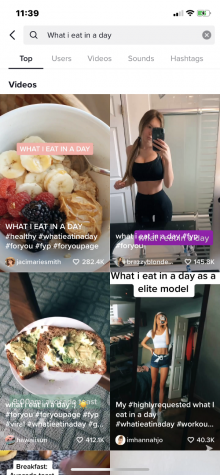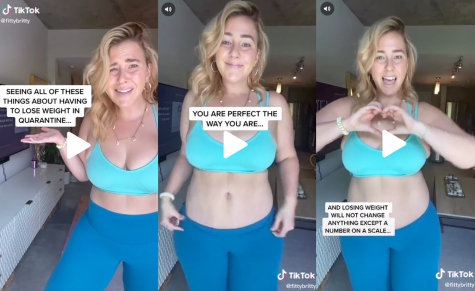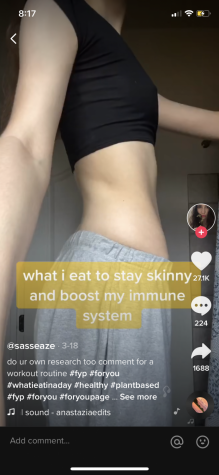Eating disorders should not be glorified
December 7, 2020

People thrive off of gratification. By the time a child enters elementary school they are primed to think that good behavior equates to a good person. Some teachers award students that perform well on difficult tests with gold stickers. So then evidently, why wouldn’t people expect this mentality to continue through other obstacles in a growing teenagers’ life? As they step on the scale and their number drops by a few pounds, why wouldn’t the teenager feel a subconscious sense of accomplishment? If a teenager is distracted by other implications in his or her life, why wouldn’t we expect them to be prideful of skipping a meal? After all, many teenagers feel the media has glorified unhealthy eating habits to a certain degree, and hasn’t our generation grown up on social media?
In my opinion, teenagers are undereducated about eating disorders. Yes, we may cover the topic as a whole in health for a unit but I personally do not think many of us truly understand the severity of eating disorders. By only teaching high school students the cookie-cutter definitions of “anorexia” and “binge eating”, there is a missed opportunity for students to understand the importance of healthy eating habits as opposed to just memorizing terms for a test. In addition to the lack of proper education on this topic, social media heightens the struggles for many teenagers.
Social media influencers use their platform to show off whatever hope will please their audience in order to maximize the number of their followers. A recent issue with the media that I’ve noticed does not directly pertain to social media influencers. Take the Kardashians for example. It has been acknowledged that influencers such as the Kardashians – who have what society may view as a “perfect body”-often post pictures of themselves. To many people, these posts make the viewer feel insecure in their own skin. But everyone that feels this way has the option to unfollow or block these influencers. This option will hide the social media influencer’s posts from the user’s feed. Nonetheless, there has recently been an increase in body shaming through new apps such as Tiktok. While there are some creators that strive to promote body positivity, they are sadly overlooked by the amount of negativity I find on my randomized Tiktok feed. If a person who appears a bit larger posts a video on the app, I can expect the comment section to be filled with a mix of negative responses and backhanded compliments. There is a drastic difference between saying that someone is confident and saying that someone must have a lot of confidence to post a video like the one they are seeing.

If a person who appears a bit thinner posts a video on the app, I can expect the comment section to be filled with self-deprecating remarks such as, “I am never eating again” or “I’m not hungry anymore”. I find that users either find it comforting to make comments on the person’s body in a negative manner or to condemn their own body in comparison to the one shown before them. This new situation is difficult to prevent because unlike the past when insecurities surfaced from social media influencers’ posts, it is now a common occurance to see body shaming on the average person’s tiktok. Body shaming has become so normalized through Tiktok, that users can not even keep up with blocking or unfollowing specific accounts to avoid these comments.
Tikok among many other beloved platforms have instilled the belief that commenting on the way you view other people’s bodies is acceptable. Some people may share the opinion that this is helpful in reminding people how they can be healthier. Personally I was brought up to never comment on someone’s body in a possibly negative manner, even if that can nudge them in a healthier direction. Tons of people, especially teenagers struggling to find themselves, have a long list of insecurities bottled up inside of them. Even small remarks about someone’s rib cage popping out or someone putting on a few extra pounds could completely alter that person’s mental state. I think it’s important to try to be mindful of others because no one knows the full extent some people may be struggling internally to accept themselves.

Social media has fundamentally changed the way teenagers view their bodies but it has also glorified unhealthy eating habits. On platforms, for example on Tiktok, users often post “what I eat in a day” videos. In many cases, the portion sizes they show are unbelievably small and some just skip meals altogether. Regardless, the users posting these videos think little of the repercussions of their post, standardizing unhealthy amounts of food. Personally, I can attest to these videos making viewers compare our own portion sizes with the ones shown. The most dangerous part is that we don’t even realize we make these comparisons as often as we do.
I wanted to incorporate some of my personal beliefs into this story because while I am fortunate enough to not have any experience with an eating disorder, I am a teenger living in the 21st century with social media. I have witnessed social media negatively impact me and those I surround myself with in relation to highlighting our insecurities. It is normal to feel this way every once in a while. However, if these insecure feelings develop into a change in eating habits, please follow the steps listed in this multimedia package about how to stay healthy. It is also important to hold yourself accountable and not justify not eating for an entire day with excuses. Food fuels the body so it is important to nourish it the proper way and make time for what is important. To all the readers currently struggling with an eating disorder, know that no one is discrediting how much you are struggling, and small progress is still progress. Even if you are gradually working towards your goals, make sure you have goals set in place and are striving to lead a healthier lifestyle.